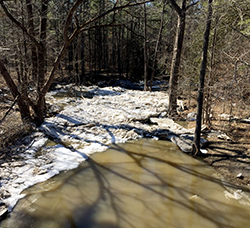Winter Road Salt, Deicers, and Water Quality
 by Executive Director Chris Boget
by Executive Director Chris Boget
Don’t let warm fall weather fool you—winter will arrive eventually, and now is the time to prepare. This winter you can keep you and your guests safe and also protect the water quality of local rivers and streams. Just like excess fertilizers spread on lawns, excess deicing products can wash into local waterways that eventually flow into Lake Champlain.
Do you ever wonder why White Pine trees along Vermont’s highways display brown needles in the spring? Deicing compounds applied by road crews (most often the less expensive sodium chloride, or rock salt) help keep driving surfaces less icy and safer for winter travel. However the deicing compounds can injure and impede the growth of trees and shrubs after the winter storms have subsided. High salt concentrations in ponds and local streams have also been shown to harm frogs, salamanders, and fish. You can transfer the valuable lessons learned from visible roadside damage to protect your yard’s landscaping—and still maintain safe driveways and sidewalks.
The first—and easiest step—to protect water quality is simple; use deicing products only when necessary. After small snowfalls consider reaching for the shovel instead of the bucket of deicing product. (A quick check of the weather, and knowing the effects of sunshine on key parts of the driveway to see if Mother Nature is going to melt the snow, is a great back-saving measure as well.) If possible, pushing snow piles off into a vegetated area of your yard (away from sensitive trees)—instead of the roadside ditch—will allow the deicing products to break down within the soil.
As we all know, winter in Vermont means snow and cold temperatures. Before outdoor surfaces around your home get slippery, take a moment to consider alternatives to rock salt and other deicing products. When you just need additional traction, consider spreading natural kitty litter, sand, or sawdust. Also keep in mind that rock salt does not work below 15 degrees Fahrenheit.
You may have heard about eco-friendly and pet-safe deicing products. Some alternatives to rock salt, including calcium magnesium acetate, magnesium chloride, and potassium chloride, are believed to be safer for the environment. One can now read online reviews that compare and contrast the effectiveness of deicers and their potential damage to pets, plants, and driveway surfaces. Though these products are marketed as being safer, the truth is there is no completely safe alternative when it comes to the deicing compounds reaching waterways.
When winter’s grip locks your driveway or sidewalk in ice, it is important to use deicers wisely. You can reduce the amount needed by spreading the product evenly, trying to avoid creating any piles that can wash away before the next storm. Mixing sand or other natural traction aids with deicers can also help protect water quality by reducing the total amount spread.
By making some adjustments to your snow and ice clearing routine and using deicers sensibly, you can help keep your property safe and protect the Lake. To learn more about how you can help improve water quality, please contact us at .

